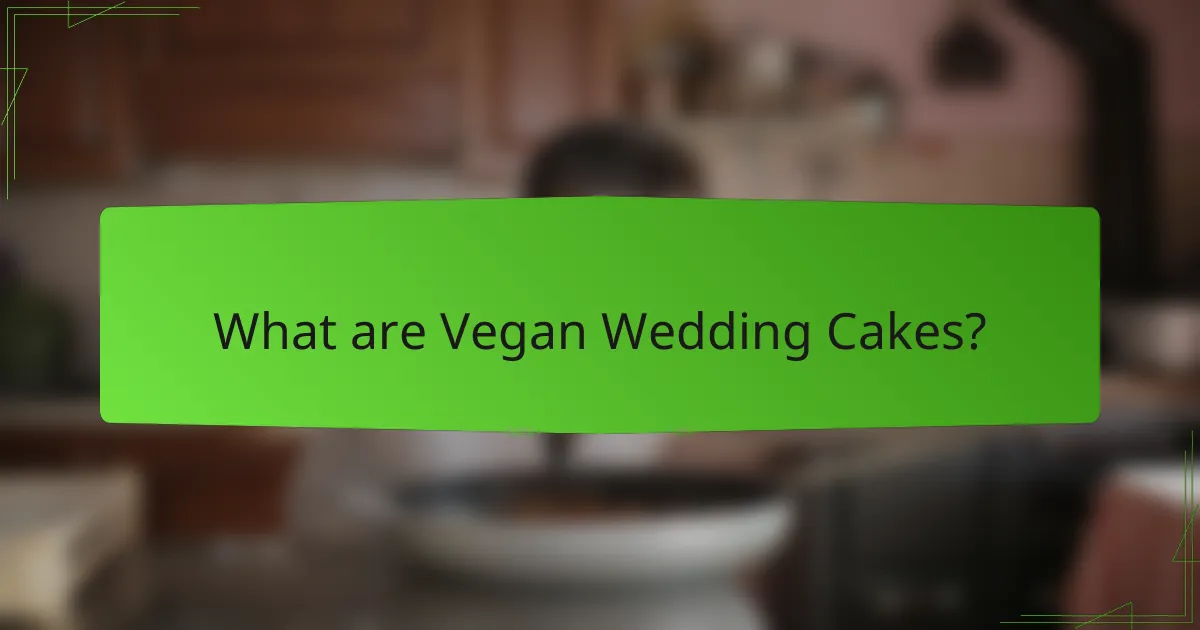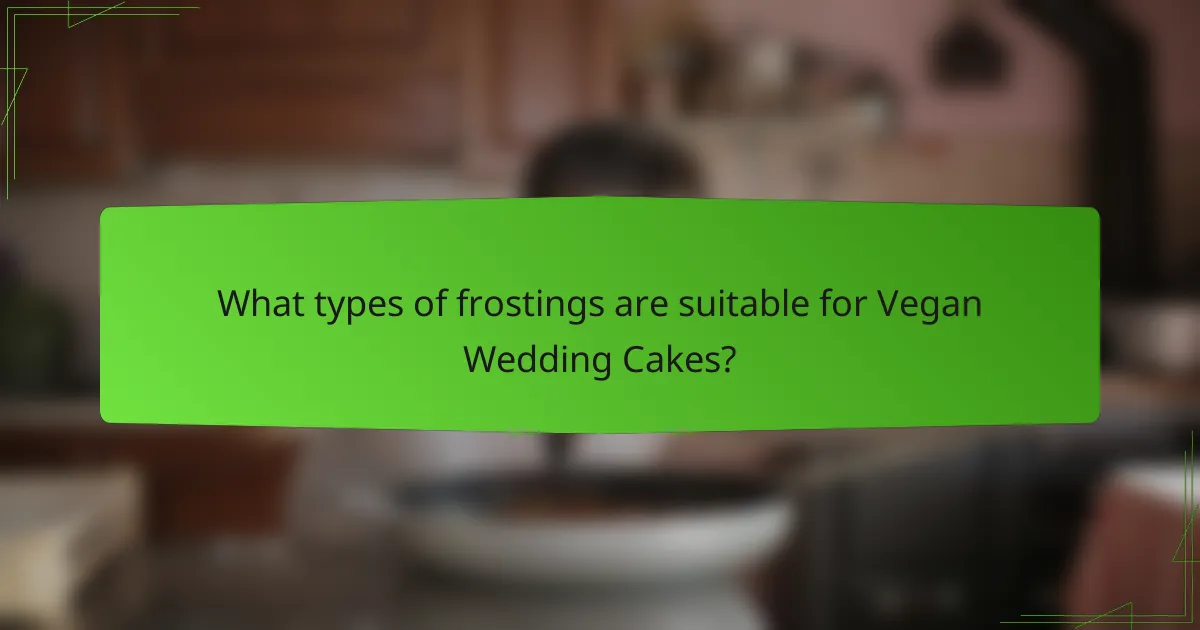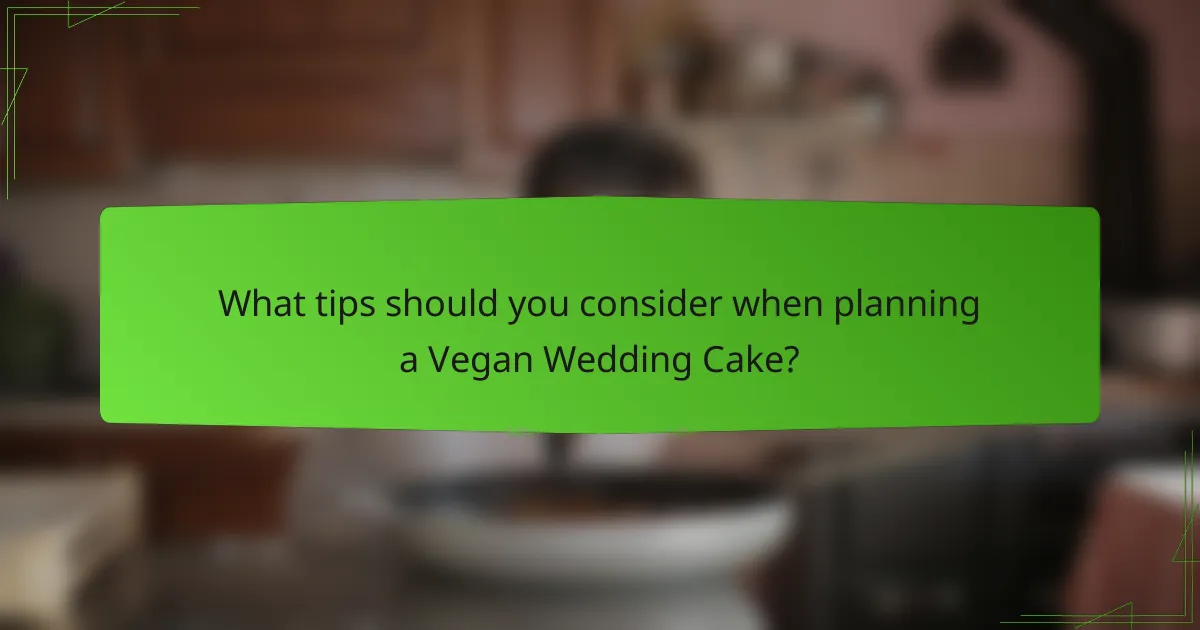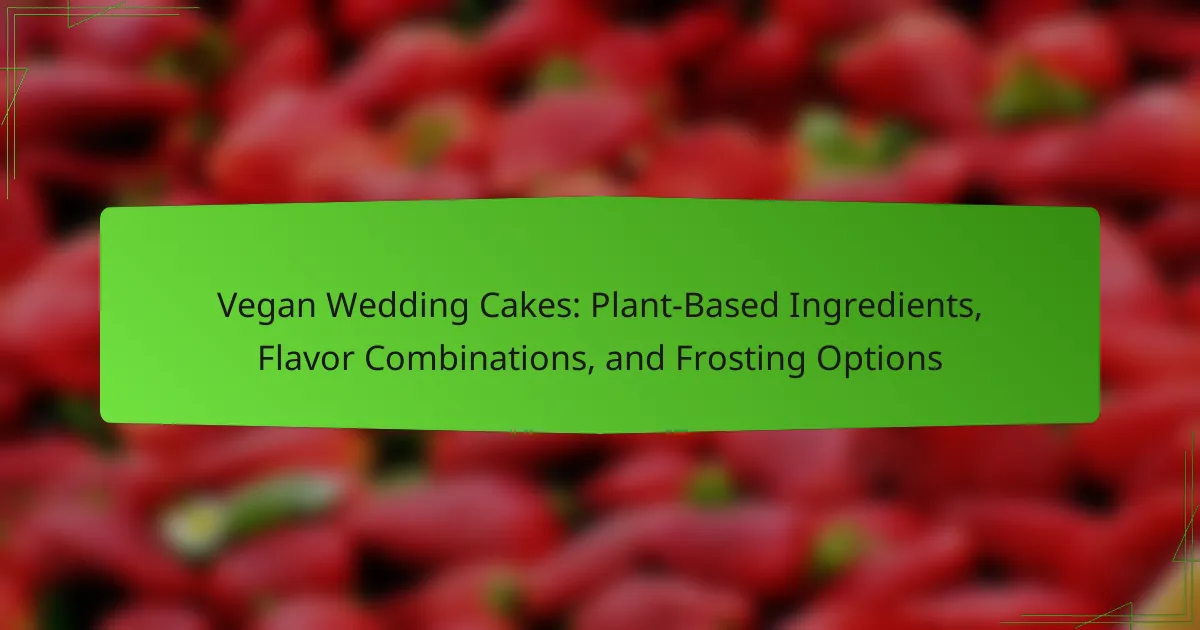
What are Vegan Wedding Cakes?
Vegan wedding cakes are cakes made without any animal products. These cakes typically use plant-based ingredients such as flour, sugar, and non-dairy milk. Common substitutes for eggs include applesauce, flaxseed, or aquafaba. Vegan wedding cakes can be flavored with fruits, nuts, and spices. They are often frosted with vegan buttercream or fruit-based frostings. These cakes cater to those following a vegan lifestyle or with dietary restrictions. The demand for vegan options has increased, reflecting a growing trend in sustainable and ethical eating.
How do Vegan Wedding Cakes differ from traditional wedding cakes?
Vegan wedding cakes differ from traditional wedding cakes primarily in their ingredients. Vegan cakes do not contain any animal products, such as eggs or dairy. Instead, they use plant-based alternatives like flaxseed, applesauce, or almond milk.
These substitutions affect the texture and flavor profile of the cake. Vegan cakes often rely on ingredients like coconut oil or vegan butter for moisture and richness. Additionally, traditional cakes may use gelatin for structure, while vegan cakes utilize alternatives like agar-agar or chia seeds.
The flavor combinations can also vary significantly. Vegan cakes often incorporate unique ingredients, such as nut flours or fruit purees, to enhance taste. This can lead to a wider variety of flavors compared to the more conventional options found in traditional wedding cakes.
In terms of frosting, vegan options typically use plant-based creams or coconut cream instead of buttercream. This results in a different mouthfeel and flavor. Overall, the primary distinction lies in the exclusion of animal products, leading to unique textures and flavors in vegan wedding cakes.
What ingredients are typically used in Vegan Wedding Cakes?
Vegan wedding cakes typically use plant-based ingredients. Common ingredients include flour, sugar, and non-dairy milk. Vegetable oils, such as coconut or canola oil, are often used for moisture. Additionally, fruit purees like applesauce or mashed bananas serve as egg substitutes. Baking powder and baking soda are essential for leavening. Natural sweeteners, such as maple syrup or agave nectar, may also be included. For flavor, vanilla extract or cocoa powder is frequently added. These ingredients create a delicious and cruelty-free cake option.
Why choose a Vegan Wedding Cake for your special day?
Choosing a vegan wedding cake ensures a plant-based, ethical dessert option for your special day. Vegan cakes are typically made without animal products, making them suitable for various dietary preferences. They often use ingredients like almond milk, coconut oil, and flaxseed as substitutes. These ingredients can create rich flavors and moist textures. Many vegan cakes are also lower in cholesterol, appealing to health-conscious couples. Additionally, vegan cakes can cater to guests with dairy allergies or lactose intolerance. The growing popularity of veganism means that many bakeries now offer delicious vegan cake options. This trend allows couples to celebrate inclusivity while enjoying unique flavor combinations.
What are the key components of a Vegan Wedding Cake?
A Vegan Wedding Cake primarily consists of plant-based ingredients. Key components include flour, sugar, plant-based milk, and a leavening agent. Common flour types are all-purpose or whole wheat. Sugar is typically granulated, but alternatives like coconut sugar can be used. Plant-based milk options include almond, soy, or oat milk. Leavening agents such as baking powder or baking soda help the cake rise. Additionally, vegan butter or oil is used for moisture. Flavorings like vanilla extract or cocoa powder enhance taste. Vegan frosting often includes powdered sugar and plant-based butter or cream. These ingredients create a delicious, cruelty-free cake suitable for weddings.
How do plant-based ingredients contribute to the flavor and texture?
Plant-based ingredients enhance flavor and texture in various ways. They provide unique taste profiles that can complement or replace traditional ingredients. For example, fruits like bananas or applesauce add natural sweetness and moisture. Nuts and seeds contribute richness and a crunchy texture.
Additionally, spices and herbs can intensify flavor without added calories. Ingredients like coconut milk or almond milk create creaminess in batters. The use of whole grains can add density and a hearty texture.
Research shows that plant-based ingredients can yield cakes that are just as flavorful and appealing as their non-plant counterparts. A study from the Journal of Food Science highlights that consumers often prefer the taste of cakes made with plant-based ingredients. This indicates that plant-based components can successfully deliver both desired flavors and textures.
What role do egg substitutes play in Vegan Wedding Cakes?
Egg substitutes play a crucial role in vegan wedding cakes by providing binding and moisture. They replace the structural function of eggs, ensuring the cake holds together. Common egg substitutes include applesauce, flaxseed meal, and aquafaba. These alternatives contribute to the cake’s texture and prevent it from being dry. For instance, flaxseed meal mixed with water mimics the binding properties of eggs. Research shows that using these substitutes can yield cakes that are both fluffy and moist. Thus, egg substitutes are essential for achieving the desired consistency in vegan wedding cakes.
What flavor combinations work best for Vegan Wedding Cakes?
Popular flavor combinations for vegan wedding cakes include chocolate and raspberry, lemon and blueberry, and vanilla and almond. Chocolate pairs well with raspberry for a rich and tart contrast. Lemon and blueberry create a refreshing and zesty flavor profile. Vanilla and almond provide a classic and nutty taste. Other combinations include carrot and pineapple, which offer a sweet and spiced flavor, and coconut and lime for a tropical twist. These combinations are favored for their balance and appeal to diverse palates.
How can you choose complementary flavors for your cake?
To choose complementary flavors for your cake, start by identifying a primary flavor. Common options include chocolate, vanilla, or fruit. Next, consider flavors that enhance the primary choice. For example, chocolate pairs well with coffee or hazelnut. Vanilla complements citrus or almond flavors effectively.
You can also explore contrasting flavors for balance. Sweet flavors can be balanced with a hint of salt or acidity. For instance, lemon zest can brighten a rich chocolate cake. Additionally, consider the texture and aroma of the flavors. Spices like cinnamon or nutmeg can add warmth to cakes.
Experimentation is key. Create small test batches to find the best combinations. Flavor pairing charts can provide guidance, showing which flavors traditionally work well together. Ultimately, trust your palate and choose combinations that excite you.
What are some popular flavor profiles among Vegan Wedding Cakes?
Popular flavor profiles among vegan wedding cakes include chocolate, vanilla, and lemon. Chocolate vegan cakes often use cocoa powder and plant-based milk. Vanilla cakes typically incorporate vanilla extract and almond milk. Lemon cakes are made with fresh lemon juice and zest for a bright flavor. Other trending flavors include carrot, red velvet, and almond. Carrot cakes use grated carrots and spices for a rich texture. Red velvet cakes often feature beetroot for color and flavor. Almond cakes are made with almond flour and extract, providing a nutty taste. These flavors appeal to a wide range of palates and are commonly chosen for celebrations.
How can you customize your Vegan Wedding Cake?
You can customize your Vegan Wedding Cake by choosing unique flavors, fillings, and decorations. Popular flavor options include chocolate, vanilla, lemon, and red velvet. You can also incorporate fruit purees or spices for additional taste. Selecting fillings such as vegan cream, fruit compotes, or nut butters adds depth. For decoration, consider fresh flowers, edible glitter, or themed cake toppers. Customization allows for personal expression and dietary needs. Vegan cakes can be made with various plant-based ingredients like almond milk or coconut oil. This flexibility ensures that the cake aligns with your vision and preferences.
What are the options for different cake sizes and shapes?
Cakes come in various sizes and shapes to suit different occasions. Common cake sizes include 6-inch, 8-inch, 10-inch, and larger tiers for multi-tiered cakes. Shapes can vary from round, square, and rectangular to more unique forms like heart or hexagon. Custom shapes often cater to specific themes or preferences. For example, a wedding cake may feature multiple tiers in round or square shapes. The choice of size and shape impacts the number of servings and the overall presentation. Standard cake serving sizes typically range from 1 to 2 inches per slice, influencing the total number of guests served.
How can you incorporate personal touches into your cake design?
Incorporating personal touches into your cake design can be achieved through customized decorations. Personalization can include elements like initials, names, or meaningful dates. You can also use specific colors that represent the couple’s theme. Incorporating favorite flavors or ingredients adds a unique touch. Edible flowers or specific motifs can reflect the couple’s personality. Handmade cake toppers can serve as a memorable focal point. Additionally, using photographs or illustrations can create a sentimental connection. These methods enhance the overall significance of the cake for the couple.

What types of frostings are suitable for Vegan Wedding Cakes?
Suitable frostings for vegan wedding cakes include vegan buttercream, coconut whipped cream, and aquafaba meringue. Vegan buttercream is made using plant-based margarine or shortening and powdered sugar. It can be flavored with extracts or cocoa powder. Coconut whipped cream is created from chilled coconut milk, providing a rich and creamy texture. Aquafaba meringue uses the liquid from chickpeas to create a light and airy frosting. Each of these options is dairy-free and aligns with vegan dietary requirements, making them ideal for vegan wedding cakes.
How do Vegan frostings differ from traditional frostings?
Vegan frostings differ from traditional frostings primarily in their ingredients. Traditional frostings often contain dairy products like butter and cream. In contrast, vegan frostings utilize plant-based alternatives such as coconut oil, vegan butter, or nut milks.
This substitution eliminates animal products, making vegan frostings suitable for those following a plant-based diet. Vegan frostings can also incorporate natural sweeteners like agave or maple syrup instead of refined sugar. The texture and flavor profiles may vary due to these ingredient changes.
For example, coconut cream can provide a rich, creamy consistency similar to traditional frosting. Additionally, vegan frostings may include unique flavors from ingredients like avocado or cashews. These variations allow for diverse options in vegan wedding cakes.
What are the most common types of Vegan frostings?
The most common types of vegan frostings include coconut cream frosting, avocado frosting, and cashew cream frosting. Coconut cream frosting is made from whipped coconut cream and sugar, offering a light and fluffy texture. Avocado frosting uses ripe avocados blended with cocoa or sweeteners for a creamy and rich flavor. Cashew cream frosting is created by soaking cashews and blending them with sweeteners and flavors, resulting in a smooth and decadent finish. These frostings are popular for their plant-based ingredients and versatility in flavor combinations.
How can you achieve the desired consistency in Vegan frostings?
To achieve the desired consistency in vegan frostings, use the right combination of ingredients. Start with a base of vegan butter or coconut cream for a smooth texture. Gradually add powdered sugar until the frosting reaches the desired thickness. Incorporate plant-based milk to adjust consistency if it’s too thick. For a lighter frosting, use aquafaba as an alternative to butter. Ensure all ingredients are at room temperature for better blending. Mixing on medium speed helps achieve a fluffy consistency. Finally, refrigerate the frosting briefly if it becomes too soft. These methods are proven to create a stable and spreadable vegan frosting.
What are some creative frosting ideas for Vegan Wedding Cakes?
Vegan wedding cakes can feature a variety of creative frosting ideas that enhance their appeal. Coconut whipped cream offers a light and airy texture. It is made by chilling coconut cream and whipping it until fluffy. Aquafaba frosting is another innovative option. It utilizes the liquid from chickpeas to create a meringue-like consistency. Cashew cream frosting provides a rich and creamy alternative. This is made by blending soaked cashews with sweeteners and flavorings. Fruit-based frostings can also be used. Pureed berries or citrus zest can add natural sweetness and color. Chocolate ganache made with dairy-free chocolate can create a decadent finish. This is achieved by melting chocolate with plant-based cream. Each of these frosting options complements the flavors of vegan wedding cakes while maintaining a plant-based profile.
How can you use fruits and herbs in Vegan frosting recipes?
Fruits and herbs can enhance vegan frosting by adding flavor and natural sweetness. For instance, pureed fruits like strawberries or raspberries can be mixed into frosting for a fruity taste. These fruits not only provide flavor but also natural color. Herbs such as mint or basil can be finely chopped and incorporated for a unique aromatic experience.
Using fruit extracts is another method; they intensify the flavor without altering the texture. Citrus zest, like lemon or orange, can add brightness and acidity to balance sweetness. Additionally, dried herbs can be infused into the frosting base for a subtle taste.
These methods allow for creativity while ensuring the frosting remains plant-based. The combination of fruits and herbs can result in a frosting that complements the overall cake flavor.
What are the benefits of using nut-based frostings?
Nut-based frostings offer several benefits for vegan wedding cakes. They provide a rich, creamy texture that enhances the overall taste. Nuts are high in healthy fats, which contribute to a satisfying mouthfeel. These frostings can be made with various nuts, allowing for diverse flavor profiles. Nut-based options are often more nutrient-dense than traditional frostings. They can also be naturally sweetened, reducing the need for added sugars. Additionally, nut-based frostings are typically free from dairy, aligning with vegan dietary choices. Their versatility makes them suitable for different cake flavors and styles.

What tips should you consider when planning a Vegan Wedding Cake?
When planning a Vegan Wedding Cake, prioritize plant-based ingredients. Use alternatives like almond milk or coconut milk for moisture. Incorporate flaxseed or chia seeds as egg substitutes for binding. Choose natural sweeteners such as maple syrup or agave nectar instead of refined sugar. Select high-quality vegan butter or coconut oil for rich flavor and texture. Experiment with various flavors, including chocolate, vanilla, or fruit-infused options to appeal to diverse tastes. Opt for vegan frosting made from cashews or coconut cream for a creamy finish. Ensure all decorations, including fondant and sprinkles, are vegan-friendly to maintain the theme.
How can you ensure your Vegan Wedding Cake is a crowd-pleaser?
To ensure your Vegan Wedding Cake is a crowd-pleaser, focus on using high-quality ingredients. Incorporate a variety of flavors that appeal to different palates, such as chocolate, vanilla, and fruit. Experiment with texture by adding elements like nuts or fruit chunks. Use natural sweeteners like maple syrup or agave to enhance flavor without overpowering it. Ensure the cake is moist by using ingredients like applesauce or non-dairy yogurt. Choose appealing frosting options, such as coconut whipped cream or vegan buttercream, to complement the cake. Offer a visually stunning design to attract attention. Consider dietary restrictions and provide gluten-free or nut-free options if needed. These strategies can significantly increase the likelihood of your cake being a hit among guests.
What are some common mistakes to avoid when selecting a Vegan Wedding Cake?
One common mistake when selecting a vegan wedding cake is not considering the flavor profile. Many couples focus solely on appearance and overlook taste. Another mistake is failing to inquire about ingredient sourcing. Some vegan cakes may still contain processed sugars or artificial additives. Additionally, not requesting a tasting can lead to disappointment. Couples should sample the cake to ensure it meets their expectations. A further mistake is neglecting dietary restrictions of guests. It’s important to consider allergies and preferences beyond veganism. Lastly, not allowing enough time for planning can result in rushed decisions. Couples should book their cake well in advance to avoid last-minute issues.
How can you effectively communicate your needs to the baker?
To effectively communicate your needs to the baker, clearly outline your preferences and requirements. Start by specifying the type of vegan cake you want. Mention any specific flavors you prefer, such as chocolate or vanilla. Indicate any dietary restrictions, like nut allergies or gluten-free needs. Provide details on the cake size and number of servings required. Discuss frosting options, including preferences for vegan buttercream or fruit-based frostings. Share any design ideas or themes you envision for the wedding. Clear communication helps ensure the baker understands your vision. This approach leads to a better final product that meets your expectations.
What are the best practices for storing and serving Vegan Wedding Cakes?
Store vegan wedding cakes in an airtight container to maintain freshness. Refrigeration is ideal for cakes with perishable fillings. For longer storage, freeze the cake wrapped tightly in plastic wrap and foil. Thaw the cake in the refrigerator before serving to preserve texture. Serve the cake at room temperature for optimal flavor. Use a serrated knife for clean slices. Avoid exposing the cake to direct sunlight or heat sources. These practices help retain the cake’s quality and taste.
How should you store your Vegan Wedding Cake before the event?
Store your Vegan Wedding Cake in a cool, dry place. Keep it in an airtight container to maintain freshness. If the cake contains perishable ingredients, refrigerate it. Ensure the cake is wrapped properly to prevent drying out. Avoid placing it near strong odors, as cakes can absorb smells. For longer storage, freeze the cake. Wrap it tightly in plastic wrap and then in aluminum foil. This helps preserve flavor and texture. Thaw the cake in the refrigerator before serving. These methods ensure your cake remains delicious for the event.
What are the ideal serving temperatures for Vegan Wedding Cakes?
The ideal serving temperature for vegan wedding cakes is between 68°F to 72°F (20°C to 22°C). This temperature range allows the flavors to be fully appreciated. Serving at this temperature ensures that the cake maintains its texture and moisture. Cold temperatures can dull the taste and affect the cake’s consistency. Conversely, serving at higher temperatures may lead to melting of frosting or fillings. Many bakers recommend allowing the cake to sit at room temperature for about 30 minutes before serving. This practice enhances the overall tasting experience for guests.
Vegan wedding cakes are desserts crafted without any animal products, utilizing plant-based ingredients such as flour, sugar, and non-dairy milk. This article explores the distinct characteristics of vegan wedding cakes compared to traditional options, including ingredient substitutions like applesauce and flaxseed for eggs, and the variety of flavors and frostings available. Key components, customization options, and tips for ensuring a crowd-pleasing cake are also discussed, alongside best practices for storage and serving. The growing trend towards veganism highlights the importance of offering inclusive and ethical dessert choices for weddings.
